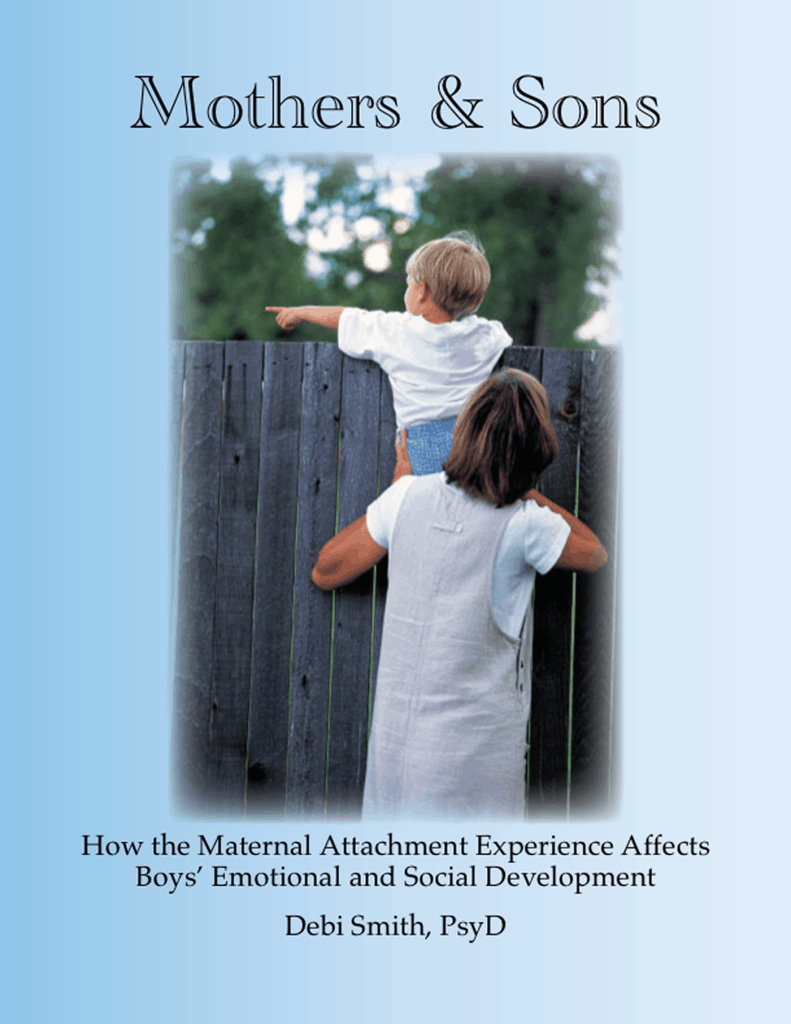Does the man you love avoid talking about feelings – his & yours? Does he shut down & stonewall when you get emotional? Does he give you his “logical answer” when you want to process what’s really going on in the relationship? If you’ve ever wondered why so many women have these same complaints about men, keep reading.
Attachment Theory helps explain why so many men are emotionally unavailable. Basically, a man is born more sensitive than a woman, but his upbringing teaches him to hide his vulnerability.
Understanding Men Through Attachment Theory
Attachment Theory is based on the research finding that every human being needs someone who is available & responsive to his/her needs from the womb to the tomb.
Research by Dr. John Bowlby, a British psychiatrist, showed that babies not only need to be fed and protected, but also need strong emotional bonds.
- Every baby is born with an attachment system to ensure its physical & emotional survival.
- When a baby is angry, sad, hurt, or afraid, his attachment system cries out & moves him toward someone who can care for him.
- When someone is available & responsive to his needs, he feels safe.
- If his experience is consistently positive, his memories of being comforted will soothe him when no one is readily available.
Positive early emotional memories, as well as sights, sounds, smells, taste, & touch, help him develop healthy beliefs about himself:
- I am lovable.
- I can depend on others to love me & to help meet my needs.
The “relational template” he develops (comforting or distancing) becomes his pattern for future relationships.
Of course, this is true for girl babies, too.
But I’ll talk about that in a different post.
What Changes for Boys?
At the beginning of life, a baby boy’s emotional experience is much like a baby girl’s. However, boys are more emotionally & socially sensitive. Therefore, they feel every experience more intensely.
However, most boys are pushed away at an early age. That experience forms a negative belief about what it means to be a man & what a man can expect from others … especially from a woman.
His natural sensitivity often causes considerable pain & confusion as he matures. According to research …
- Infant boys are more emotionally & socially sensitive at birth (Brody & Hall, 1993; Levant, 2001).
- By the time a boy starts school, he has learned to hide most feelings — especially if they show his vulnerability (Levant, 2001; Pollack, 1998).
- Nearly every boy repeatedly experiences socially acceptable shaming.
- A boy learns to appear tough, aggressive, dominating, & non-emotional.
- Many boys & men demonstrate limited emotions — usually anger.
- Men withdraw from emotional discussions to protect their vulnerability.
A boy who needed love & acceptance, but was rejected & shamed for his vulnerability instead, has experienced far more pain than women will ever understand.
Rejection & shame during childhood & adolescence leave a boy alone to deal with complex feelings, especially guilt, humiliation, shame, anxiety, depression, anger, and rage.
Women are confused about what it means to grow up male (Pollack, 1998).
A boy usually has no place to turn. No one to help him with his pain.
Where Did His Mom Go?
A mother often feels uncertain about how to raise a healthy man. Consequently, she may feel pressured to push her son away.
His mom actively, but often unknowingly participates in “the hardening process through which society shames boys into suppressing their empathic and vulnerable sides” (Pollack, 1998, p. 40).
This usually happens when he needs her reassurance & instruction most:
- The first time is when he goes off to school.
- The second is when he’s going through puberty.
Free Download
Exploring the impact of maternal attachment on the emotional and social development of boys, Dr. Smith uses Attachment Theory to elucidate and integrate aspects of the mother-son relationship from birth through adolescence.
An overview of Attachment Theory is followed by several perspectives on male development.
The Clingy or Abusive Mom
On the other hand, some women use their sons to fulfill their own emotional needs. This topic requires a much deeper discussion than we have space for here. But I will be talking about it elsewhere on this blog.
A Father’s Guidance
Fathers who have also been pushed away & rejected have no idea how to be there for their sons. All they know to do is show them how to avoid vulnerable feelings, often “at all costs.” Dads mostly demonstrate their strategies through their on lack of emotional availability.
Remember that early experiences provide a boy with images & feelings that form his understanding of how to form relationships and how dependable he can expect those relationships to be based on …
- mom’s & dad’s availability & responsiveness to him, and
- how effective he has been in getting others to respond to his needs.
So boys move from mother disconnection to father disconnection. No wonder he learns to shut down his feelings. He does it to survive!
The Crises of Boyhood
Growing up is complicated & confusing for a boy.
And he is often without emotional support.
Researchers (e.g., Levant, 2001; Pollack, 1998) have identified several stages when boys have emotional crises. The first crisis sets the stage for the second. Both help explain why men are emotionally unavailable as adults.
- The first crisis is the beginning of school (e.g., kindergarten).
- The second is as a teenager as he tries to understand adult sexuality & all there is to know about girls.
The first crisis is actually several years in the making and is fundamentally the result of how we socialize our sons’ emotions. Because of widespread beliefs in U.S. society about how boys and men ought to behave (what I call the “code of masculinity”), we tend to get swept up in a process of shaping and channeling boys’ expression of emotions so that, although boys start out life more emotional than girls, they wind up much less so. By the time a boy enters school he has learned to hide and feel ashamed of two important sets of emotions: those that express vulnerability in one way or another (fear, sadness, loneliness, hurt, shame, and disappointment) and those that express neediness, caring or connection to others.
Levant, 2001, p. 355
The Code of Masculinity
Levant, Hirsch, Celentano, and Cozza (1992) examined major American beliefs. Their study revealed that boys & men are “supposed to be”:
- independent and self-reliant,
- non-expressive of emotions related to vulnerability or attachment,
- tough and aggressive,
- driven toward high social status,
- perpetually in the mood for sex,
- disinterested in anything feminine, and
- interested only in sex.
Pollack’s (1998) “Boy Code” is a similar list. These sound a lot like survival techniques for a tenderhearted boy. Don’t you think?
- Be a Sturdy Oak. Whimpering, crying, complaining, or any sign of weakness is strictly forbidden.
- Give ‘Em Hell. Boys are encouraged in risk-taking behavior characteristic of a macho, invincible, sometimes violent, high-energy superman.
- Be the Big Wheel. To survive, he must dominate others & refuse to let anyone know he actually feels like a failure or like life is out of control.
- No Sissy Stuff. This last commandment (survival technique) is like an emotional “straitjacket” that keeps boys from expressing feelings “seen (mistakenly) as ‘feminine’— dependence, warmth, empathy” (p. 24).
Other Important Questions
- Was he a victim of abuse (emotional, physical, sexual)?
- How did discipline (spanking, hitting, shaming) affect him?
- What was his parents’ relationship like?
- How was his relationship with siblings?
- What did he learn from sports?
- Was he a “jock” or a “nerd”?
Summary for Understanding Emotionally Unavailable Men
So many factors go into making a man. But emotional separation & rejection are highly common experiences for nearly all boys.
We must learn appreciate that men have been able to survive in a world that is unfriendly toward males.
Being more sensitive by nature, many boys could not have survived to see adulthood if they had not developed some highly effective defenses.
- Not surprisingly, the classic male stereotypes are avoidant or dismissing.
- Common complaints from women range from
- lack of feeling and/or sensitivity toward others to
- aggressive and/or angry outbursts
- To expect a boy or man to be empathic toward others is an unreasonable request if he himself has not had the experience of being:
- understood
- accepted
- loved
- Generally, the world may not be a safe place for a man. The only way he has survived so far is to cut off his feelings. Or at least to keep them from showing.
- Anger & depression are not uncommon responses to teasing & shaming. Yet boys and men are expected to learn to control their anger, rather than to understand it.
Solutions for Understanding Emotionally Unavailable Men
When a man (or boy) is emotionally unavailable, he probably has a very good reason.
- The short solution is that men need empathy.
- The more difficult task, however, is to teach women how to understand & empathize with men in a way that doesn’t add further shame, manipulation, and trauma.
References
NOTE: As an Amazon Associate I earn from qualifying purchases.
Brody, L. R., & Hall, J. A. (1993). Gender and emotion. In M. Lewis & J. M. Haviland (Eds.), Handbook of emotions (pp. 447-460). New York: The Guilford Press. [Amazon link]
Levant, R. F. (2001). The crises of boyhood. In G. R. Brooks & G. E. Good (Eds.), The new handbook of psychotherapy and counseling with men (Vol. 1, pp. 355- 368). San Francisco: Jossey-Bass. [Amazon link]
Levant, R. F., Hirsch, L. S., Celentano, E., & Cozza, T. M. (1992). The male role: An investigation of contemporary norms. Journal of Mental Health Counseling, 14, 325-337.
Pollack, W. S. (1998). Real boys: Rescuing our sons form the myths of boyhood. New York: Henry Holt and Company. [Amazon link]
Smith, D. L. (2009). Mothers and sons: How the maternal attachment experience affects boys’ emotional and social development. [instant download available from Dr. Debi Smith on Thinkific.com]
Quick Start Guide to Understanding Men

Do you want to know more about your husband? Learn what Dr. Debi learned about men as a Clinical Psychologist working with men & the women they love for 25+ years.
Get instant access to Dr. Debi’s FREE WORKSHOP for women. Watch it whenever you want & as often as you want. Click here for more info.





6 Replies to “Understanding Emotionally Unavailable Men”
Comments are closed.